With discounters booming in the cost of living crisis, what’s motivating Lidl’s move to slow down expansion?
What’s going on at Lidl? Its sales are soaring, market share is growing, and yet for reasons widely unknown, it seems to be taking its foot off the gas on its once ambitious expansion plans.
Even those inside Lidl have been caught off guard. “No one was expecting it,” says one graduate brought on board last autumn to help develop Lidl’s new stores, but now laid off. “It was shocking and all the graduates were fuming. On joining we were told Aldi had seized an opportunity in 2008 by continuing construction when the market crashed, and now Lidl was going to do the same.”
It did not – hence the redundancies. As The Grocer revealed in February, Lidl has halved its projected store openings for the year from the usual 50-plus to 25, in a slowdown some suggest could extend until 2026.
Lidl said it was focusing on growing warehouse capacity, as indeed it has been, with its biggest DC ever due to open in Luton in August. But many believe there is more to the explanation.
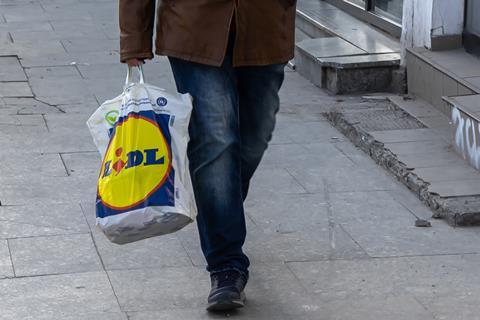
“Lidl GB has probably been asking for about €1bn investment to be signed off [for 2023], and I believe they managed no more than €250m,” says Ronny Gottschlich, who was Lidl’s UK CEO from 2010 to 2016. “This is clearly signalling a change in the German HQ’s appetite and ability.”
Why the change? Experts point first to high interest rates, which will be impacting Lidl after years in which it has taken advantage of low rates to fuel rapid international expansion. “Lidl has had very good development over the last 10-15 years because of the extremely low interest rates, meaning they could get money very cheaply,” says Marc Houppermans, a former Aldi Netherlands board member, now executive partner at Düsseldorf-based Discount Retail Consulting, which helps discounters scale and set up across the world. “They grew faster than Aldi in a lot of countries.”
However, the financing method is a crucial point of difference from Aldi. “Aldi is fully private equity financed, it’s all its own equity, from the [founding Albrecht] families,” says Houppermans, who claims the Albrecht family predicted their advantage would become clear during an economic downturn. “When I worked at Aldi, they always said ‘wait till the moment comes when interest rates go up, because then Lidl will have a hard time’.”
“They will be cherry picking. Where do I put my money now, where can I get the highest return?”
Marc Houppermans, former Aldi Netherlands board member
Lidl will now be looking to change the ratio of equity to debt, and “that means you have to keep more profits in your organisation and not invest as much”, says Houppermans.
Gottschlich estimates the debt of Lidl’s parent the Schwarz Group at €20bn-€23bn. “And you can just imagine what that means, if the interest rates have been increasing by one or two percentage points,” he says.
In the case of the UK operation, the group achieved profits of just £41m from £7.8bn revenue in the year to 28 February 2022, according to its latest account. It’s a ratio which Lidl GB CEO Ryan McDonnell himself cited as evidence of a business still “running lean and mean”. Perhaps too lean.
“In the east of Europe, you do not see the same slowing in expansion of stores,” says Houppermans. “Lidl has high returns in those businesses, whereas in the western European countries, the returns are significantly lower, with the labour costs, the rental costs, the competition being mostly higher.
Read more:
-
Christian Härtnagel’s legacy of loyalty at Lidl
-
Aldi and Lidl: the story behind the rise of a retail empire
-
‘It’s too late for me’ says Deane Proctor, the supplier suing Lidl
-
Has Lidl taken on too much in US expansion plans?
“So, they will be cherry picking. Where do I put my money now, where can I get the highest return?”
There has also been a change in tack on investment since 2021 after the shock resignation of CEO Klaus Gehrig at Lidl’s owner, Schwarz Group, according to Houppermans. Owner Dieter Schwarz, then 81, took over the helm himself at the time, filling in until the internal promotion of Gerd Chrzanowski as CEO in December of that year.
“Gehrig was someone who’d been strongly leading Lidl’s and Schwarz’s businesses almost for the whole 50 years of Lidl’s existence, who suddenly moved out, for new and younger future-proof management,” says Houppermans.
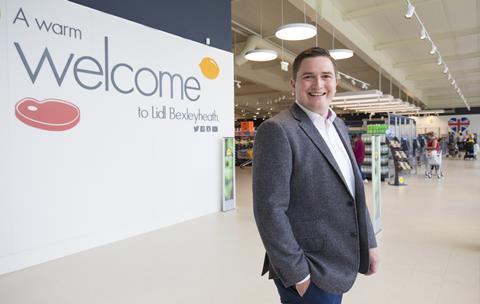
Schwarz Group – which also owns the supermarket chain Kaufland – has since become “more agile”, with a greater focus on IT where it feels it can create additional value across the whole group, Houppermans adds.
Recently published accounts show the group invested €8bn in strategic projects and digital business segments in the year to 28 February 2023, including the expansion of Schwarz Produktion, with activities focused primarily on safeguarding supply chains, as well as on store expansion and modernisation.
“That’s the way it is – we don’t follow Aldi on every price anymore”
A new culture
The changing approach is said to have extended to a new leadership culture. “It’s a much stricter view on return on investment now,” an industry source in Germany tells The Grocer.
“The old way was: ‘if you’ve got a case for it, then do it’ and if it didn’t work, people were sacked for it. That was the way it was in the first decades. Now, a case has to be proven a lot more stringently, and argued with return-on-investment calculations. It’s become a more mature business in its approach.”
Paul Foley, who was Aldi’s UK & Ireland CEO from 1999 to 2009, says a good explanation for the issue of Lidl’s slowing expansion is the “newish top management in Neckarsulm [Germany] identifying where the performance is weaker than average and demanding local management address this”.
Lidl’s share of the UK grocery market has shot up from 6.9% to 7.7% in the past year, and Aldi’s from 9% to 10.1% [Kantar 12 w/e 14 May 2023]. But along with the influx of new customers, the cost of living crisis will also have brought added pressures for both discounters, says Gottschlich. “As much as they love more customers coming to them, more of them are shopping more private label.”
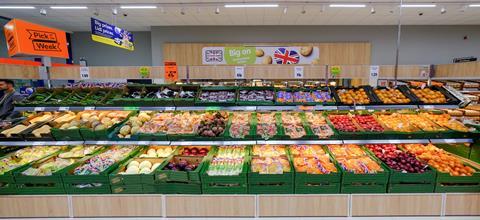
Not only that, but more will be trading down from premium-tier own label. And for all their value and own-label focus, for the discounters, just as for other retailers, that downward trading means lower margins, Gottschlich adds.
Higher margins also come from the non-food middle aisle, but “customers are shying away from those products in these inflationary times”, he adds. “Aldi is experiencing the same pressures. It isn’t an easy time for either.”
Indeed, Aldi has been slow to open stores this year too. Despite plans to open 40 throughout 2023, and a commitment to spending £400m on store development during the year, its UK number remained at “over 990” from January until June, when it finally announced five new sites to begin trading within the next few weeks.
But while Aldi will also be “scrutinising” its openings, its finance structure gives it “a little more resilience”, says Gottschlich. Lidl, on the other hand, is likely coming under pressure from above to “lower costs and increase sales and margins in existing space”, says Foley.
Indeed, in Germany, there have been reports of some surprising price movement at Lidl this year. In February, Lebensmittel Zeitung (translating as ‘Food Newspaper’), reported examples of Lidl straying above Aldi on price. That included Lidl continuing to sell organic milk at €1.45 after Aldi had dropped its price to €1.35.
“That’s the power of Lidl. They show the customers they are almost a normal supermarket with lower prices”
William Snollaerts, former Aldi Netherlands board member
Lebensmittel Zeitung chief correspondent Manfred Stockburger tells The Grocer he was informed by a source at Lidl: “‘That’s the way it is – we don’t follow Aldi on every price anymore.’” Lidl did, however, drop its prices following Stockburger’s enquiry.
The development was not entirely surprising to William Snollaerts, a former Aldi Netherlands board member, who believes Aldi and Lidl have always differed slightly in their pricing ambitions: Aldi has aimed to be as cheap as possible, while Lidl has sought to be as cheap as Aldi.
It’s a subtle distinction with which Gottschlich agrees. “Aldi is the price setter and Lidl is adjusting to it,” he says.
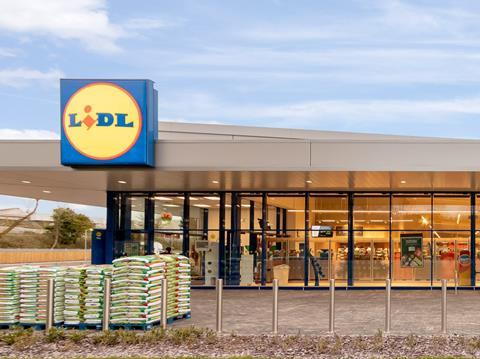
Houppermans points to its range size as a sign of Lidl’s softer discounter heart. “In Aldi you see about 1,700-1,800 SKUs, and in Lidl about 2,400, excluding the in & out [temporary] assortment.” Lidl also has larger stores, he notes. Its UK property brochure appeals for units up to 26,500 sq ft, compared with Aldi’s upper limit of 20,000 sq ft.
Snollaerts says: “What you see over the past 10 or 15 years is Lidl shifting bit by bit more to the middle of the retail landscape.
“Aldi started as a hard discounter, then it became less hard discount – but it stuck for longer to that type of discounting. Well, Lidl was already evolving to be more soft discount.
“I think that’s also the power of Lidl. They show the customers they are almost a normal supermarket with lower prices.”
So, could we even see an under-pressure Lidl begin to edge up in pricing in the UK in pursuit of margin growth?
“It would be very strange to me to believe Lidl was preparing to take pricing to a higher level than Aldi,” says Foley.
Houppermans thinks it would be a high-risk, potentially irreversible move. “If you start increasing your prices, you find going down again very hard because your organisation has adapted to it,” he says.

But if prices cannot be increased, another way to improve margins is in lowering costs. “Lidl is doing a lot in improving operational excellence,” says Houppermans. “They’re still investing, just at the moment not so much in the stores but more in the DCs, in production facilities, in actually having their supply chain be more efficient and lean.
“They will try to gain more margin that way, because otherwise they will lose the low pricing positioning.
“In all of Europe, they’re still opening DCs, or scaling up existing DCs, having more and bigger warehouses, and making them more efficient and automated.”
The view aligns with Lidl GB’s explanation in February. “Whilst this is a slowing on store openings, we are focusing on investing heavily in our warehouse capacity: opening Luton, completing extension works on our Bridgend and Belvedere sites, and looking for a new site for the south,” a spokeswoman said at the time.
In May, the discounter submitted planning permission for another 600,000 sq ft DC in Gildersome, Leeds.
Better serving its stores gives Lidl a way to ease margin pressure in them while keeping prices low. But in the meantime, new ones may have to wait.
The riddle of Lidl and its faltering plans to take over in the UK
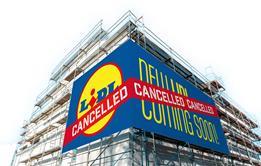
With discounters booming in the cost of living crisis, what’s motivating Lidl’s move to slow down expansion?
 Currently
reading
Currently
reading
The riddle of Lidl and its faltering plans to take over
- 2









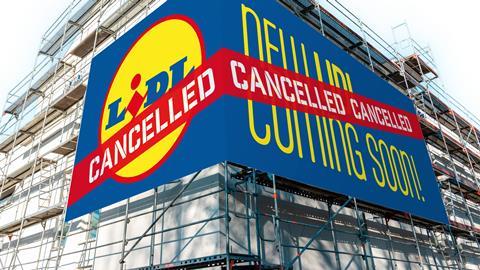





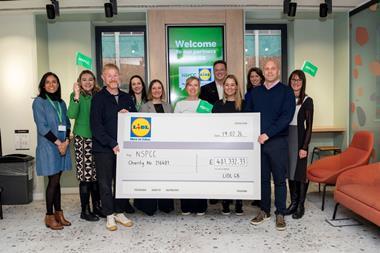
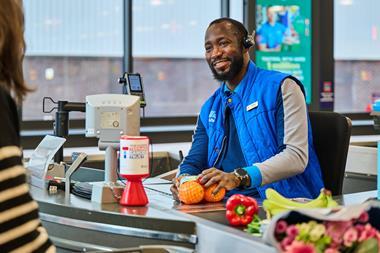






1 Readers' comment